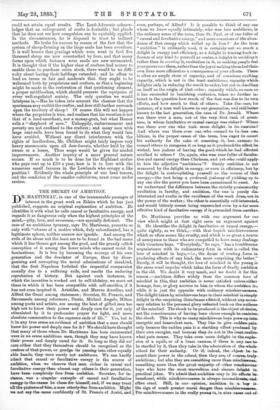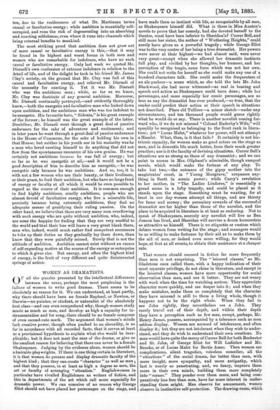THE SECRET OF AMBITION. R:MARTINEAU, in one of the innumerable
passages of interest in the great work on Ethics which he has just published, suggests an original explanation of ambition. He identifies it with what he calls causal or facultative energy, and regards it as dangerous only when the highest principles of the mind,—pity, love, and reverence,—are specially deficient. The case of an ambitions tyranny, says Dr. Martineau, presents us only with "abuses of a motive which, duly subordinated, has a legitimate sphere, neither narrow nor ignoble. And among the evils of its abuse not the least are to be found in the bad name which it has thence got among the good, and the grossly selfish conception of it among the lower minds who cannot resist its fascinations. It is less by becoming the scourge of his own generation and the desolator of Europe, than by disorganising andcorrupting the moral admirations of mankind, that the first ' Napoleon forfeited the respectful compassion morally due to a suffering exile, and merits the enduring reprobation of history. But' against such instances, in which the incentive is worked out to self-idolatry, we must set those in which• it has been compatible with self-sacrifice, if it has not even inspired it. Aristides, and Marcus Aurelius, and Alfred the Great among statesmen ; Socrates, St. Francis, and Savonarola among reformers ; Dante, Michael Angelo, Milton among poets and artists, are among the host of gifted men too high-not to know their power and deeply care for it, yet only stimulated by it to profounder prayer for light, and more absolute consecrationto the supreme ends of life." Yes, but is it in any true sense an evidence of ambition-that a man should know his power-and deeply care for it P We should have thought that many of-those whom Dr. Martineau has here enumerated were in no sense ambitions men, though they may have known theirpower anddeeply . cared for it. So long as they did not care either thatthey themselves should be recognised as the centres, of that-power,or grudge its passing into other equally able hands; they were surely not ambitions. We can hardly admit that causal or facultative energy is the source of
ambition, when we observe that men richer in causal and facultative energy than almost any°therein their generation, have been completely free front. ambition. Socrates, for in stance, was a singular example of causal and facultative energy inthe career he chose for himself, and; if we -may trust all the pictures of him, a man utterly-free from ambition. Might we not say the same confidently of St. Francis of Assisi, and even, perhaps, of Alfred ? Is it possible to think of any one whom we know equally intimately, who-was less ambitious, in the ordinary sense of the term, than St: Paul, or of one fuller of " causal and facultative energy," and more conscious of the abundance of that energy which welled upin-hint -PAs the term" ambition " is ordinarily used, it is certainly not. so much a delight in energy and efficiency, as a delight in .tracingvback influence of any kind to yourself as centre,a delight in wielding it rather than in exerting it, exultation-in•it, as-making. people feel your power over them, rather than the joy-of making-them,feel their own lives more efficient as a consequence of.your efforts. There
is often an ample store of capacity, and of conscious, exultingcapacity, which is not. in the least-.ambitions; capacity.whielt, delights only -in reducing• the. world. to-order, but not indwelling on itself as the origin of 'that order ; capacity whichAsosoon• as it has succeeded in banishing. confusion,takesno further interest in the question-how-much ofthe-feat svas.dueto its own, efforts, and how much to that ofothers.) Take,tho case, for instance, of a man well-known-to our generetion, and stilbbetter known to the last generation, the. case-of Dr. Arnold. Where, was there ever a man, not.of the-very. first. rank of) great ness, in whom facultative or.cansal energy? . Where was there ever one who took, mom-delight. in its-exercise? And where was there-everonewho,seamed. to be-less anis bitions, in the proper, sense of theterm, less -eager )to,assert his authority for thesake of• asserting,ik. less, anniturs.) to. compel others to recognise it so long-as it produced-the effect he. wished, less jealous of-having the-gooclwhich le-had, effected ascribed to others ? Or; again, whowtio ever fullerof facultative and causal energy-than Clarkson,-andyet who could apply to him the adjective "ambitiousPPSurely ambition is not measured by the delight in-energy, or even in efficiency; but by the delight in contemplatingyourselfasthe• source, of that energy,—the test being a profound jealousy of yieldingup toany one else the power-you have been, emu-got:tied-to exert. As we understand the differencebetween-the-strieRy -praiseworthy exultation in faculty, and ambition, theoneis purely dieinterested and exults in-the)excellesiee of. the work done, not in the power of the worker; the,other is essentially self,interested, and would bitterly resent being superseded even by,afav more effective kind of facultative energy if it_ proeeeded)freinanother.
Dr. Martineau provides us with one argument for our view which might at first _ sight seem, an argument, against it. He identifies the delight in ,facultativeor causal energy.,— quite rightly, as we think,_—with that boyish mischievousness which so often seems like-cruelty, and which is so great a source of annoyance to those who-are compelled to have many dealings with vivacious boys. " Everybody," he, says, " has a troublesome acquaintance with its rudimentary form in what is called. the. love of mischief in boys,—i.e., the desire of venting ,force, in producing effects of any kind, the more surprising ,the better." Surely, it will be thought, the love of mischief in the young is the same cruel impulse which takes_thelorm of deadly ambition in the old. We doubt it very much, and we doubt it for this reason :—ambition differs widely from the common love of mischief in this, that ambition is . never. satisfied unless-either homage, fear, or glory accrues tohint in. whom .the-antbition isi while it is just the oppositewith-, ordinarymischievousness. The delight taken by mischievous boys in-their miechiet is simplydelight in the surprising disturbance effected; without any neees. sary relation to the personal gloryreflected back on the authors. of the mischief. The shook-to beprodaced is theobject-of 'desire, not the consciousness of havingbeen clever)enough tocontrive. the shock. This is why somany mischievous boys grow-up into. energetic and benevolent men. They liketo givesudden pain only because the sudden pain is a• startling= effeet produced by their own energies, and because they -do notin the least realise. what pain means. They take-even. more. delight in-the )explosion of a squib, or of a brasscannon, if. there isany one-to be startled by it, than they )takein.theadmiratioteof the-whole school for their audacity. Ok. indeed} the, objeet• be to, assert their power in the school, then-. they-ars, of coarse, truly. ambitions; bat also they aresomething more thanmisehievons, something more than the great majority) of other raisohievous boys who have the most-marvellousand sincere delight in practical jokes.. We admitthatambitinnmay in itseffects be. beneficent, while mischievouenewria alwaye•ineonsidevate, and often cruel. Still, in• our, opinion, ambitionin-al, boy is the sign ofmuch greater-moral dangerthan misehievonerreas. For mischievousness in the really young is, in nine cases-out of
ten, due to the restlessness of what Dr. Martineau terms causal or facultative energy; while ambition is essentially selfoccupied, and runs the risk of degenerating into an absorbing and exacting selfishness, even where it runs into channels which bring external benefits to mankind.
The most striking proof that ambition does not grow out of mere causal or facultative energy is this,—that it may be found in its highest and worst forms in both men and women who are remarkable for indolence, who have no such causal or facultative energy. Only last week we quoted Mr. Disraeli's own confession of extreme indolence in relation to the detail of life, and of the delight he took in his friend Mr. James Clay's society, on the ground that Mr. Clay was full of this causal and facultative energy, and relieved Mr. Disraeli of the necessity for exerting it. Yet it was Mr. Disraeli who was the ambitious man ; while, so far as we know, Mr. Clay was destitute of any general ambition. Moreover, Mr. Disraeli continually portrayed,—and evidently thoroughly knew,—both the energetic and facultative man who looked down upon ambition, and the ambitions man who was too indolent to be energetic. His favourite hero, " Sidonia," is his great example of the former ; he himself was the great example of the latter. Doubtless, Mr. Disraeli went through a great deal of passive endurance for the sake of adventure and excitement; and in later years he went through a great deal of passive endurance in the House of Commons, for the sake of holding his own in that House; but neither in his youth nor in his maturity was he a man who loved exerting himself to do anything that did not flow from the spontaneous resources of his own genius. He was certainly not ambitions because he was full of energy ; but so far as he was energetic at all,—and it would not be a good description of him to describe him as energetic,—he was energetic only because he was ambitious. And so, too, it is with not a few women who use their beauty, or their liveliness, or their grace, to feed their ambition, but who have no large fund of energy or faculty at all which it would be even possible to regard as the source of their ambition. It is common enough to find highly ambitious, cruelly ambitious, people who are almost devoid of facultative energy, who live a miserable life, precisely because being extremely ambitious, they find no adequate means of gratifying their ruling passion. On the other hand, we believe that there are very many men overflowing with such energy who are quite without ambition, who, indeed, are none the happier for finding that they are very needful to the world and that their loss will leave a very great blank there, men who, indeed, would much rather find competent successors to take up their duties as they gradually lay them down, than know that they were painfully missed. Surely that is not the attitude of ambition. Ambition cannot exist without an excess of self-regarding motive at the source of the energy or enterprise to which it gives rise. But energy, and often the highest kind of energy, is the fruit of very different and quite disinterested springs of action.



































 Previous page
Previous page